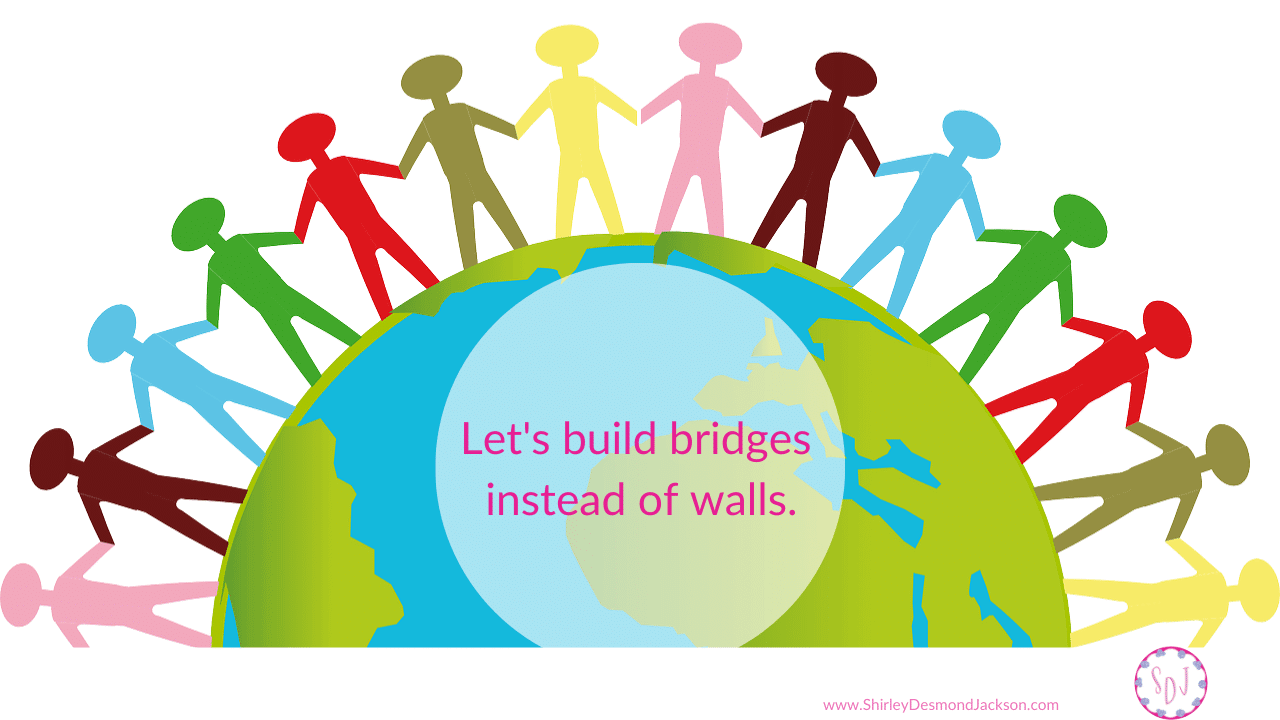Building Bridges Instead of Walls
Our world is hurting.
The words of James have guided me as I grappled with the recent events plaguing our country:
My dear brothers and sisters, take note of this: Everyone should be quick to listen, slow to speak and slow to become angry, because human anger does not produce the righteousness that God desires. (James 1:19-20 NIV)
So I have taken time to listen.
The testimonies of racial discrimination and hatred have distressed my soul. But they also opened a pathway to ask a question which has long been on my heart:
How often does this kind of treatment still happen?
I feared asking this question for two reasons:
- making my friends uncomfortable by asking them to talk about something painful.
- their answer might not be the one I hoped to hear.
Sadly these conversations forced me to face the truth. We have so much more to do in ensuring racial equality for all of God’s people.
I have been slow to speak.
I needed time to process these painful realizations. As I wrestled in prayer over the events unfolding in our cities, I wondered what I could possibly say.
This has been a time to listen, not to swap stories of discrimination or unfair treatment. But over the sixty years of my life, I know personally how racial prejudices cross all boundaries.
Ironically, the sin of racial discrimination does not discriminate; it permeates people of all races and ethnicities. While some of us fell victim to this sin, others of us committed it. Many of us have experienced both.
The solution for any and every sin is the grace of Jesus. As Christians, we can show the rest of the world how to treat each other with mutual respect and love. When we do this, we become a powerful testimony. (John 13:34-35)
I have been slow to become angry.
Anger in itself is not a sin. In the above Scriptures, James reminds us to be slow in expressing our anger. Premature reactions tend to build walls. Human anger will not produce the righteousness God desires.
I believe God would want to see us live together in harmony, showing proper love and respect for each other. (Matthew 7:12)
So I ask myself: how can I express my anger in ways to usher in God’s righteousness?
One way looks to protect the rights of all people through changes in policy. In this country, citizens use their voting voice to affect change. As Christians, we should feel free to exercise this right.
But as a Christian I also realize changing policy will not fix the problem. In the Sermon on the Mount, Jesus pointed out the limited effectiveness of laws:
“You have heard that it was said to the people long ago, ‘You shall not murder, and anyone who murders will be subject to judgment.’ But I tell you that anyone who is angry with a brother or sister will be subject to judgment. Again, anyone who says to a brother or sister, ‘Raca,’is answerable to the court. And anyone who says, ‘You fool!’ will be in danger of the fire of hell. (Matthew 5:21-22 NIV)
Jesus taught sinful behavior grows out of sinful hearts. An unchanged heart will always be fertile soil for sinful behaviors to grow.
Lasting change begins by changing hearts.
As a Christian, I cannot afford to overlook the only effective catalyst for lasting change: the gospel of Jesus Christ.
I immediately think of the Apostle Paul. Although once a violent persecutor of the church, he became an advocate of Christ’s grace. (1 Timothy 1:13) As a Hebrew and Pharisee, he must have shared the Jewish contempt for Gentiles. Yet after receiving grace, he became the apostle to the very people he once saw as inferior and “unclean”. (Romans 11:13)
As Christians, we naturally feel anger when we see injustice. But we also know the power of the gospel to change hearts.
In our anger, let’s build bridges instead of walls.
As I follow the road before me, I pray to build bridges between all people by sharing the gospel of Jesus. Wherever the Lord takes you in your travels, I pray you can do the same.
Related Post: Turning Enemies Into Friends

